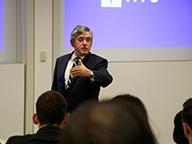Faculty News
—
Prof. Jonathan Haidt's book, "The Righteous Mind," is quoted
—

Excerpt from Salon -- "Rationality is not hardwired. Indeed, when isolated from one another, we are not particularly good at reasoning. But as even Jonathan Haidt acknowledges, 'if you put individuals together in the right way, such that some individuals can use their reasoning powers to disconfirm the claims of others, and all individuals feel some common bond or shared fate that allows them to interact civilly, you can create a group that ends up producing good reasoning as an emergent property of the social system.'"
Faculty News
—

Excerpt from Salon -- "Rationality is not hardwired. Indeed, when isolated from one another, we are not particularly good at reasoning. But as even Jonathan Haidt acknowledges, 'if you put individuals together in the right way, such that some individuals can use their reasoning powers to disconfirm the claims of others, and all individuals feel some common bond or shared fate that allows them to interact civilly, you can create a group that ends up producing good reasoning as an emergent property of the social system.'"




















